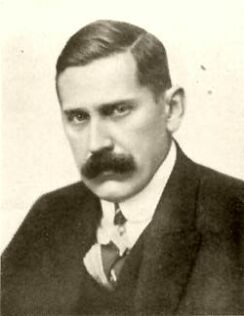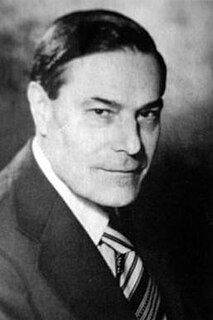Related Research Articles

Othenio Lothar Franz Anton Louis Abel was an Austrian paleontologist and evolutionary biologist. Together with Louis Dollo, he was the founder of "paleobiology" and studied the life and environment of fossilized organisms.
Oskar Seidlin was an emigre from Nazi Germany first to Switzerland and then to the U.S. who taught German language and literature as a professor at Smith College, Middlebury College, Ohio State University, and Indiana University from 1939 to 1979. He authored a number of fictional and non-fictional works.

Adalbert Czerny was an Austrian pediatrician and is considered co-founder of modern pediatrics. Several children's diseases were named after him.
Child Euthanasia was the name given to the organised killing of severely mentally and physically handicapped children and young people up to 16 years old during the Nazi era in over 30 so-called special children's wards. At least 5,000 children were victims of the programme, which was a precursor to the subsequent murder of children in the concentration camps.

Hans Otto Friedrich Schlossberger was a German physician, who was known for his research in immunology, medical microbiology, epidemiology and antimicrobial chemotherapy, especially on syphilis, typhus, gas gangrene, diphtheria, erysipeloid of Rosenbach, tuberculosis, malaria and leptospirosis. He was one of the leading immunologists and bacteriologists of Germany during his lifetime, and was a student and collaborator of the Nobel laureates Paul Ehrlich and Emil von Behring, two of the principal founders of the field of immunology.

Helmut Müller-Enbergs is a German political scientist who has written extensively on the Stasi and related aspects of the German Democratic Republic's history.
Hermann Dold was a German physician and bacteriologist.

Bernhard Fischer-Wasels, known as Bernhard Fischer until 1926, was a German physician and anatomical pathologist, who served as Director of the Senckenberg Institute of Pathology (1908–1941), Professor of Pathology (1914–1941) and Rector of the Goethe University Frankfurt (1930–1931). He was a leading cancer researcher and is world-renowned as the father of petrochemical carcinogenesis.
Friedrich Jung was a German doctor who became a leading Academic and Research Pharmacologist in the German Democratic Republic.
Heinrich Robert Hellmuth Kudicke was a German physician, epidemiologist and one of the leading experts on tropical diseases in his lifetime. He worked in Africa and China for several years. A long-time collaborator of Nobel laureate Robert Koch, he is especially known for his work with African trypanosomiasis or sleeping sickness in the early 20th century. During the early Cold War era he worked in several developing countries in connection with medical development aid programmes.

Henning Brandis was a German physician and microbiologist. He was Professor of Medical Microbiology and Immunology and Director of the Institute for Medical Microbiology and Immunology at the University of Bonn from 1967 until his 1984 retirement. He was editor-in-chief of the journal Zeitschrift für Immunitätsforschung. He was a member of the Academy of Sciences Leopoldina and received the Officer's Cross of the Order of Merit of the Federal Republic of Germany in 1976 for services to medical microbiology.
Hans Georg Haussmann was a German physician, microbiologist and an expert on transfusion medicine.
Wolfgang Weimershaus was a German physician, microbiologist, politician of the liberal Free Democratic Party, and poet.
Martin Sommerfeld was a Jewish emigre from Nazi Germany to the U.S. who was a professor at the University of Frankfurt and subsequently at Columbia University, the City College of New York, Smith College, and Middlebury College, where he taught German language and literature. He authored and edited a number of volumes on German literature from the 16th to the 20th centuries, and he wrote numerous contributions to the four-volume Reallexikon der deutschen Literaturgeschichte (1925–31).

Jonas Schmidt-Chanasit is a German virologist and Professor of Arbovirology at the University of Hamburg. Schmidt-Chanasit is also the Deputy Director of the WHO Collaborating Centre for Arbovirus and Haemorrhagic Fever Reference and Research at the Bernhard Nocht Institute for Tropical Medicine.

Paula Hertwig was a German biologist and politician. Her research focused on radiation health effects. Hertwig was the first woman to habilitate at the then Friedrich-Wilhelms-Universität Berlin in the field of zoology. She was also the first biologist at a German university. Hertwig is one of the founders of radiation genetics alongside Emmy Stein. Hertwig-Weyers syndrome, which describes oligodactyly in humans as a result of radiation exposure, is named after her and her colleague, Helmut Weyers.
Joseph Maria Müller-Blattau was a German musicologist and National Socialist cultural official. He is regarded as a "nestor of Saarbrücken musicology" but also as a "singer of a musical seizure of power" because of his activities in National Socialism.
Helmuth Osthoff was a German musicologist, university professor and composer.
Sandra Ciesek is a German physician and virologist. She is the director of the Institute of Medical Virology at the Universitätsklinikum Frankfurt and professor of medical virology at the Goethe University Frankfurt. Her main areas of research include new forms of therapy for hepatitis C and, more recently, the search for drugs against COVID-19.
Gotthold Frotscher was a German music historian and musicologist.
References
- ↑ Werner Schuder (ed.): Kürschners Deutscher Gelehrten-Kalender, vol. 2, 10th ed., Berlin, 1966, p 2165.
- ↑ August Ludwig Degener, Walter Habel (eds.): Wer ist wer?: das Deutsche who's who, vol. 42, Schmidt-Römhild, 2003 ISBN 3795020360. p 1244.
- ↑ Obituary in Berliner Ärzte